Unlock the secrets for your gut health with simple diet changes that can make a world of difference in how you feel every day.
Gut health is at the core of our overall well-being. The digestive system is often referred to as the “second brain,” with its health influencing everything from digestion to mood, immunity, and even cognitive function.
The gut is home to trillions of microorganisms, known as the gut microbiota, which play a crucial role in maintaining health. The foods we eat, the supplements we take, and our daily habits significantly impact the health of this microbiome.
- This article explores the vital connection between diet and gut health, offering insights on how to improve gut health through nutrition, supplements, and lifestyle changes.
What is Gut Health?
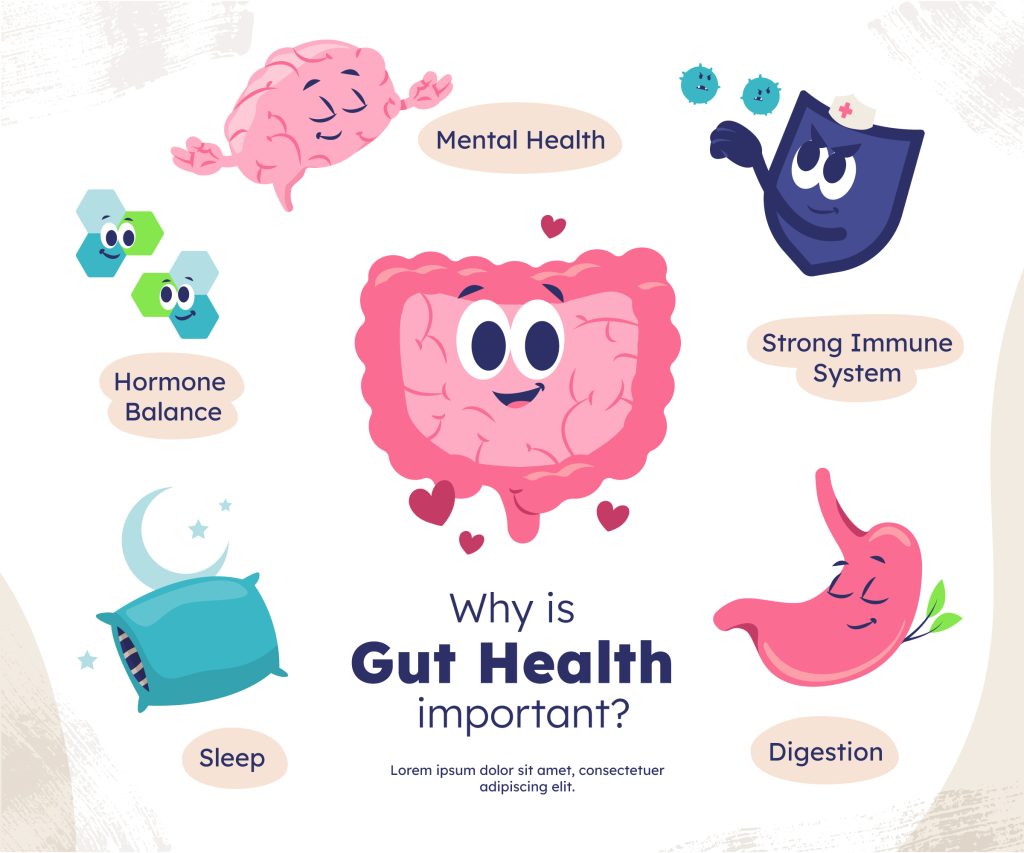
This refers to the balance and function of the bacteria and other microorganisms in the digestive system. These microorganisms are collectively known as the gut microbiota.
They are essential for,
- digesting food
- absorbing nutrients
- supporting the immune system
Healthy gut microbiota is diverse and balanced. It contains a wide variety of beneficial bacteria and other microorganisms that work together to maintain digestive health.
Gut bacteria are beneficial for
- breakdown of food
- production of vitamins
- protection against harmful pathogens
Unbalanced gut bacteria lead to different health problems such as
- digestive disorders
- weakened immunity
- even mental health issues
Gut health is very vital for overall human well-being.
How does Diet Affect Gut Health?
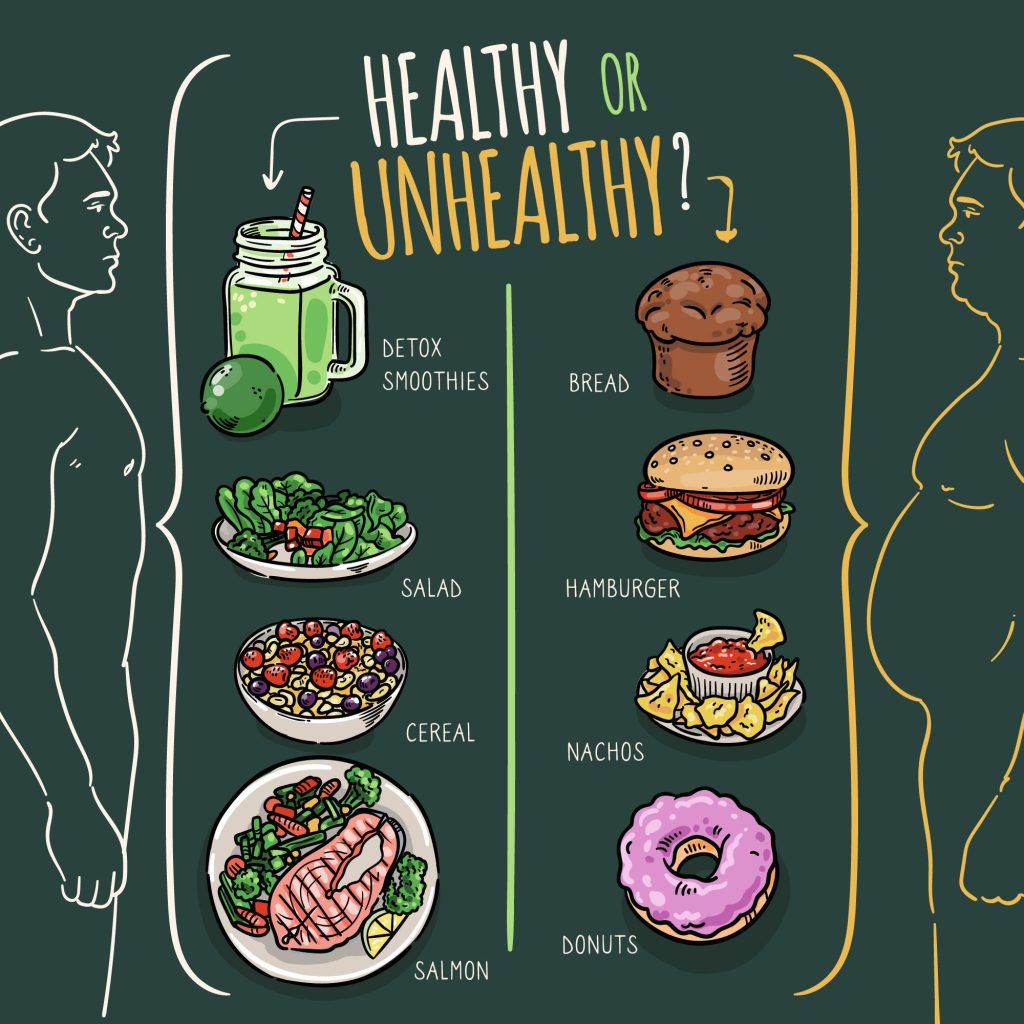
The foods we consume directly impact the composition and diversity of our gut bacteria.
Foods to heal your gut should made of a diet rich in fiber, fruits, vegetables, and fermented foods to boost the development of healthy bacteria, while a diet high in processed foods, sugars, and harmful fats can damage the gut microbiota.
Following are the foods that support digestion:
-Fiber:
Fiber-rich foods include,
- whole grains
- legumes
- fruits
- vegetables
These are the primary fuel for foods with good bacteria. These foods help increase the diversity of the gut microbiota and promote the growth of bacteria that produce short-chain fatty acids (SCFAs), which are essential for healing gut.
-Fermented Foods:
Foods like,
- yogurt
- kefir
- sauerkraut
- kimchi
They are live bacteria rich in probiotics that can help restore and maintain a healthy gut microbiota.
-Polyphenols:
Foods high in polyphenols such as,
- berries
- nuts
- seeds
- green tea
They have been shown to increase beneficial bacteria and reduce inflammation in the gut.
-Prebiotics:
These are non-digestible fibers that feed healthy gut bacteria. Foods like,
- garlic
- onions
- bananas
- asparagus
They are wonderful sources of prebiotics.
How to Heal Your Gut :

Healing of gut involves rebalancing the gut microbiota, reducing inflammation, and healing the gut lining.
Here are some steps to restore and maintain a healthy gut:
1. Eliminate Harmful Foods:
Reduce or eliminate processed foods, sugars, and unhealthy fats that can disrupt the gut microbiota and increase inflammation.
2. Increase Fiber Intake:
A diet rich in fiber from fruits, vegetables, and whole grains sustains the growth of healthy gut bacteria.
3. Incorporate Fermented Foods:
Regular consumption of fermented foods like yogurt, kefir, and sauerkraut can help replenish beneficial bacteria in the gut.
4. Consider Gut Healing Supplements
Probiotics, prebiotics, and other gut healing supplements can support gut and balance the microbiota.
5. Stay Hydrated:
Drinking plenty of water helps maintain the mucosal lining of the intestines, supporting gut health.
6. Manage Stress:
Chronic stress can negatively impact our gut, so finding ways to manage stress, such as meditation, exercise, or therapy is essential. To improve mental health and stress checkout this article.
11 Easy Ways to Improve Mental Health
Probiotic Foods and Drinks
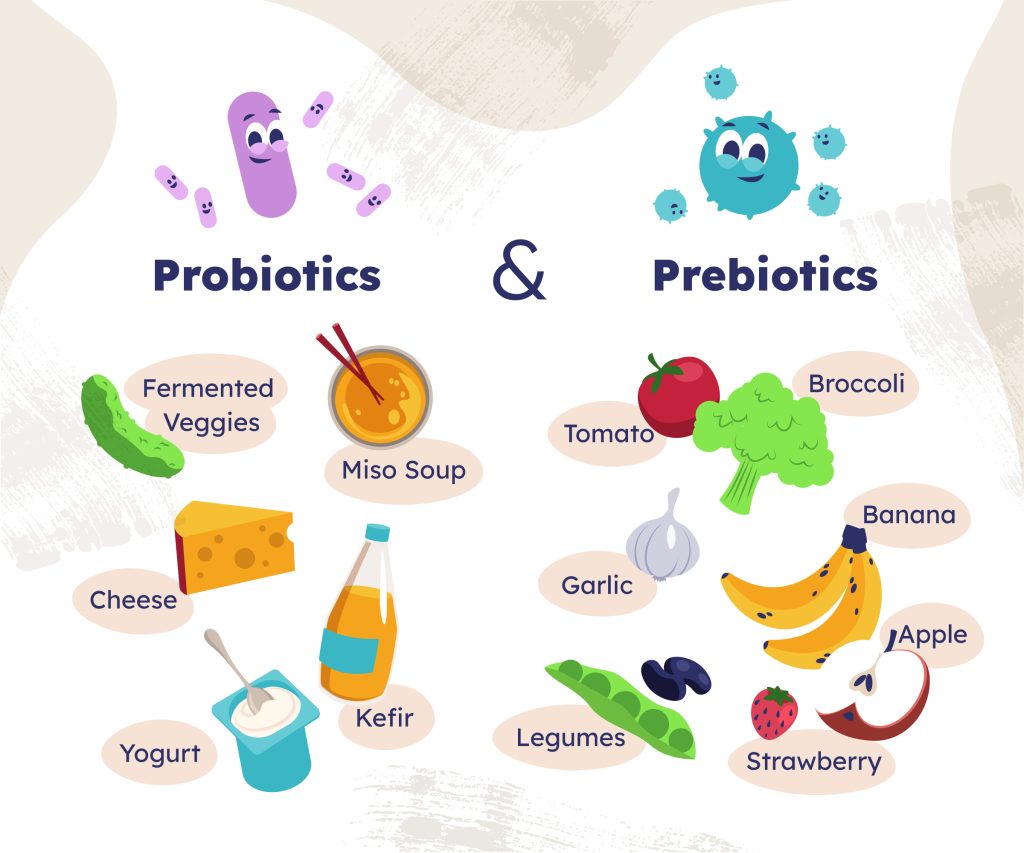
Probiotics are living bacteria that contribute multiple health benefits, especially for gut-health. Consuming probiotic-rich foods and drinks can help restore and maintain a healthy gut microbiota. Here are some of the best probiotic foods and drinks which can also be called Foods with good bacteria:
Yogurt:
One of the most well-known sources of probiotics, yogurt is rich in beneficial bacteria that can help improve digestion and boost immunity.
Kefir:
A fermented milk drink, kefir contains diverse probiotics and is an excellent choice for promoting gut-health.
Sauerkraut:
Fermented cabbage, sauerkraut is a rich source of probiotics and fiber, making it a great addition to any diet focused on gut-health.
Kimchi:
A traditional Korean dish made from fermented vegetables, kimchi is packed with probiotics and can help support gut-health.
Kombucha:
A fermented tea, kombucha is a popular probiotic drink that can help improve digestion and detoxify the body.
Common Gut Health Concerns:
Maintaining gut-health is crucial, but many people experience gut health issues that can affect their overall well-being.
Understanding the symptoms of gut health problems and knowing which foods to avoid can help manage these concerns.
Symptoms of Gut Health Issues:
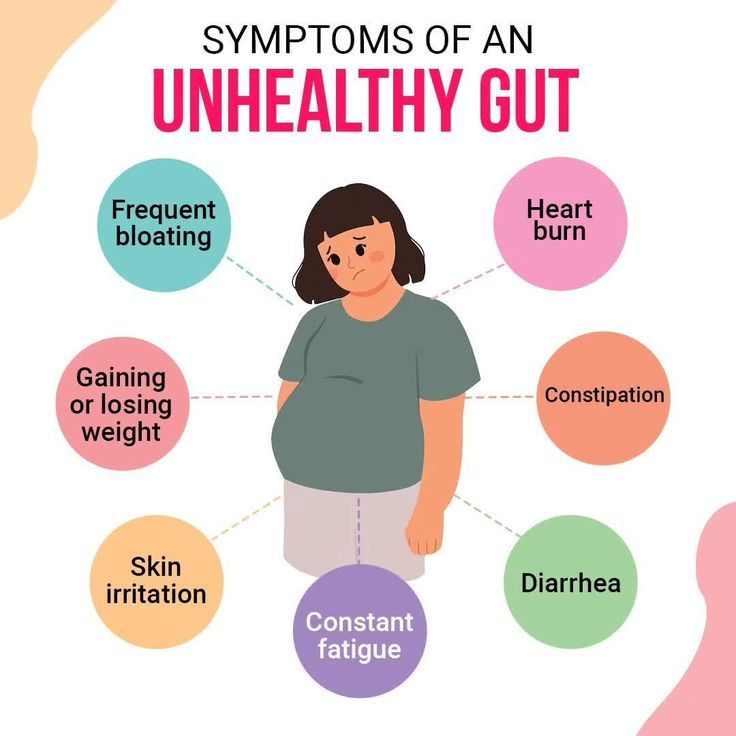
- Bloating and gas
- Constipation or diarrhea
- Stomach pain or discomfort
- Fatigue and low energy levels
- Food intolerances
- Skin problems, like acne or eczema
- Mood swings, anxiety, or depression
Foods to Avoid for Gut Health:

Processed Foods:
High in sugars, unhealthy fats, and additives, processed foods can disrupt the balance of gut bacteria.
Artificial Sweeteners:
These can alter the gut microbiota and lead to digestive issues.
Alcohol:
Excessive alcohol consumption can damage the gut lining and disrupt the microbiota.
Red Meat:
While not harmful in moderation, excessive consumption of red meat can promote the growth of harmful bacteria in the gut.
FAQs on Gut Health:
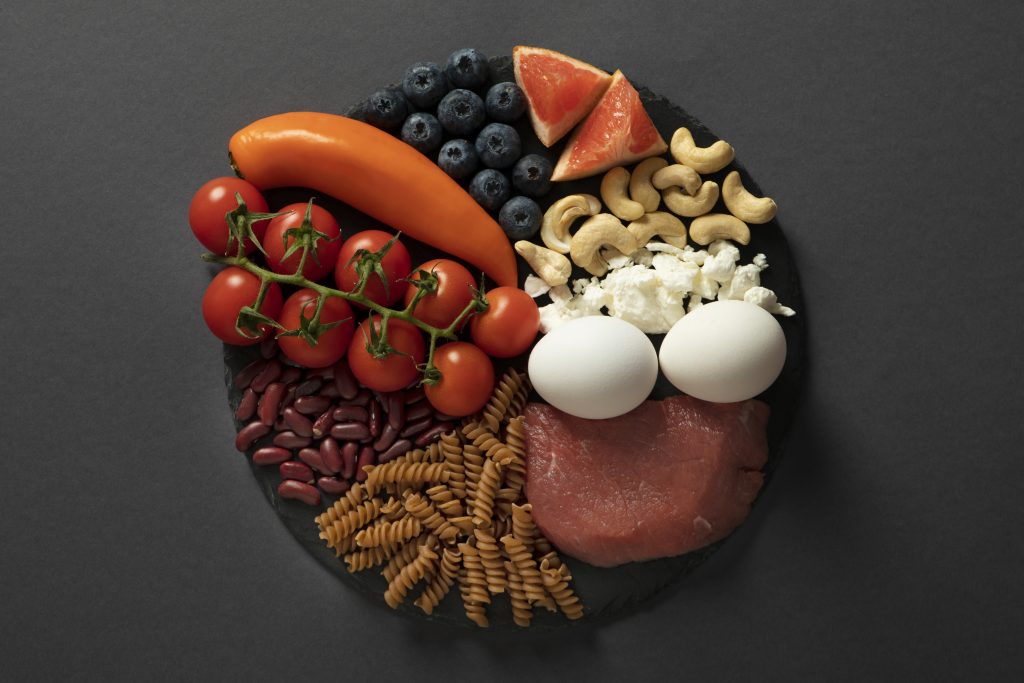
1. How Much Sauerkraut is Beneficial?
A daily serving of 2-3 tablespoons of sauerkraut is generally sufficient to provide the gut with a healthy dose of probiotics and fiber.
2. Apple Cider Vinegar Benefits:
Apple cider vinegar is known for its potential to improve digestion and support gut health. It includes acetic acid, which has antimicrobial properties and can assist in balancing the gut microbiota.
3. Is Coffee Bad for Gut Health?
Moderate coffee consumption is not harmful and can even have some benefits for gut health, such as promoting the growth of certain beneficial bacteria. However, excessive consumption can lead to digestive issues, so it’s essential to consume coffee in moderation.
4. Dr. Lipman’s Approach to Gut Health:
Dr. Frank Lipman, a leading expert in functional medicine, advocates for a holistic approach to gut health. His recommendations include a diet rich in whole foods, the use of probiotics, and the management of stress to support gut health.
5. Is Cottage Cheese Good for Gut Health?
Cottage cheese is a good source of probiotics, especially if it’s made with live cultures. It’s also high in protein and can be a beneficial addition to a gut-friendly diet.
6. Most beneficial Probiotics for Gut Health and Bloating:
Some of the best probiotics for gut health and bloating include strains like Lactobacillus acidophilus, Bifidobacterium lactis, and Saccharomyces boulardii. These probiotics can help reduce bloating and support a healthy digestive system.
7. Is Matcha Good for Gut Health?
Matcha, a type of green tea, is rich in polyphenols, which can promote the growth of beneficial gut bacteria. It even has anti-inflammatory properties that can sustain overall gut health.
How to Improve Gut Health?
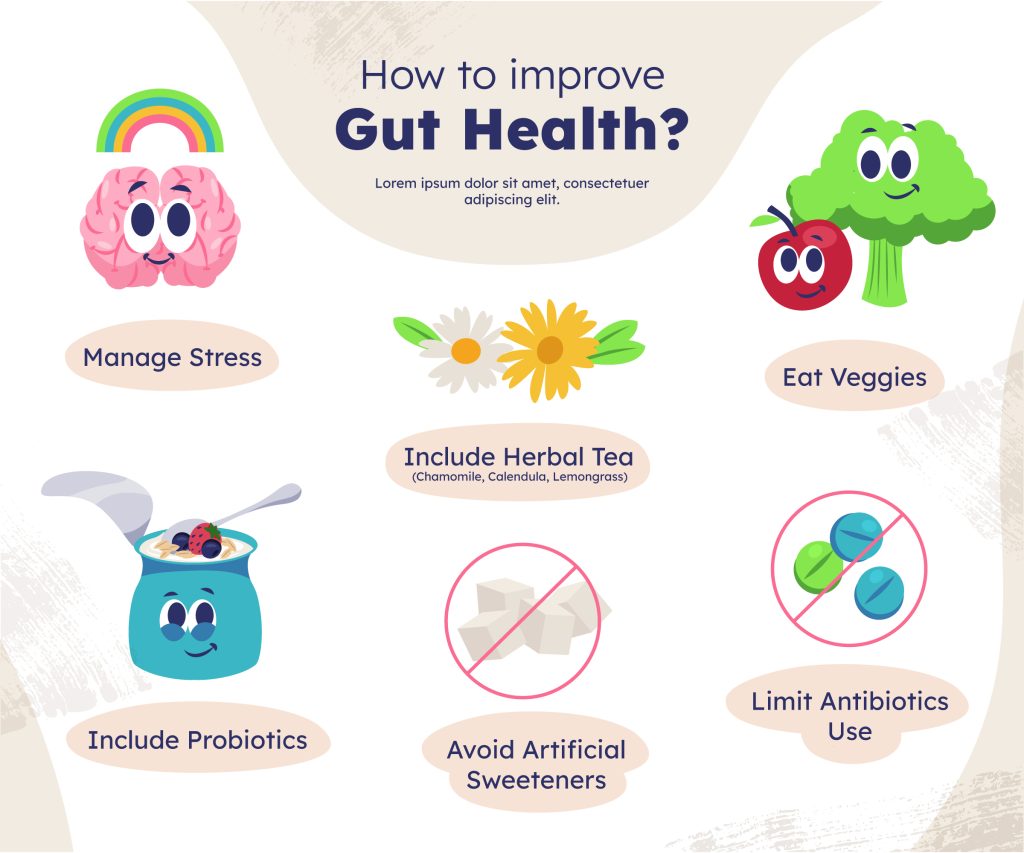
Improving gut health involves adopting healthy dietary habits, incorporating gut-friendly foods, and considering supplements that support the gut microbiota. Some recommendations for improving gut health are as follows.
Eat a Balanced Diet
Focus on whole foods rich in fiber, such as fruits, vegetables, legumes, and whole grains.
Include Fermented Foods
Regularly consume foods like yogurt, kefir, sauerkraut, and kimchi to replenish beneficial bacteria.
Stay Hydrated
Drink plenty of water throughout the day to support digestion and maintain a healthy gut lining.
Exercise Regularly
Physical activity promotes healthy digestion and supports gut health.
Consider a Gut Health Test
A gut health test can provide insights into your gut microbiota and help you make informed decisions about your diet and lifestyle.
Conclusion
- Gut health is integral to overall well-being, and diet plays a crucial role in maintaining a healthy gut.
- By understanding the connection between diet and gut health, incorporating gut-friendly foods and supplements, and making positive lifestyle changes, you can support a balanced and thriving gut microbiota.
- Remember, a healthy gut leads to better digestion, improved immunity, and a happier, healthier life.


It’s just wonderful information
Much more than enough to care about